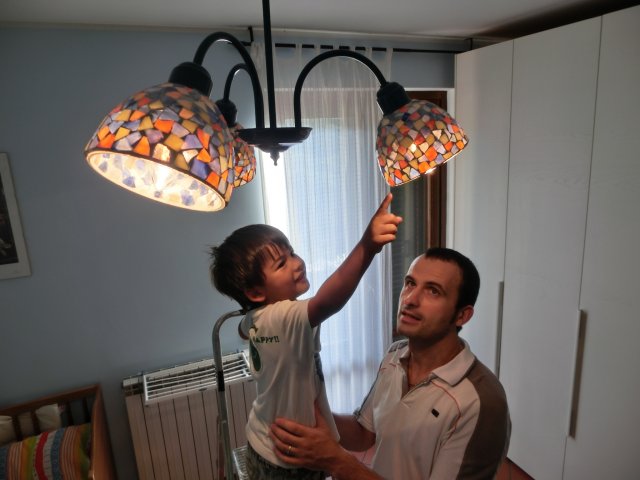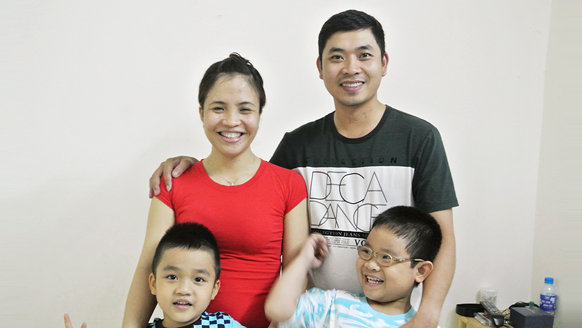
Oct 08, 2013
- Products & Solutions
- Feature Story

Hi everyone! This is Ayumi in Ho Chi Minh City, located in southern Vietnam and the largest city in the country. In the north, which includes the capitol of Hanoi, there are four distinct seasons but here in the commercial center of the country, it is hot and humid year-round with temperatures climbing above 30°C daily.
Vietnam's economy is booming and, as the population reaps the benefits, demand for consumer durables like refrigerators, washing machines and now air conditioners is increasing.
I visited a family of four in Ho Chi Minh City to see for myself how a Panasonic air conditioner is making their lives more comfortable. Linh, the mother, and Tu, the father, warmly welcomed me and introduced me to their two kids, Anh, their eldest son and his brother Vinh.
Panasonic makes its products and technologies available to a diverse range of consumers around the world. These articles show some of the ways the company is changing lives in different cultures from the views of local reporters.
This family has one air conditioner and it sees duty everyday. The room where it is installed is used for meals as well as being the children's playroom and the family's bedroom. When Linh comes home from work, the first thing she does is turn on the air conditioner then waits for her kids and husband to return. "Rather than cooling the entire house, I think of saving energy and electricity so I close the door and only cool this room," she explained. Before purchasing their Panasonic air conditioner they relied on fans to stay cool. Now they can't imagine life without it.
As is common in Vietnamese homes, Linh's floors and walls are tiled, and people usually go barefoot inside to enjoy the coolness of the floors. The family's air conditioner helps in this respect, set at a constant 26°C in Swing mode to fill the room with a gentle, cooling breeze.
Panasonic's reputation for safety and durability were the main reasons the family chose their particular air conditioner. Another was the unit's power efficiency: the ECONAVI function (http://panasonic.asia/ecoideas/econavi/) detects people's presence and level of activity then optimizes cooling accordingly.
Days are hot in Ho Chi Minh City but mornings and evenings can get chilly. That's why hot shower units are increasingly popular these days, becoming signs of status and wealth. Linh's family bought a Panasonic home shower and they absolutely love it. They say it's great after the rigors of the day, and the cool room feels so much nicer when preceded by a hot shower.
But although the shower is a pleasant luxury, Linh makes sure that it is only used when needed. The city has a serious shortage of water and electricity so she frequently turns off the tap to save water and show her children the importance of conservation.
Linh's family is not especially wealthy but they also owned other Panasonic air conditioners in the past. When she bought the new air conditioner last year, she sent the old one to her parents so they could enjoy its pleasant coolness.
Hotels and taxies are typically well air conditioned in steamy Ho Chi Minh City since many businesses believe that welcoming customers into a cool space is the proper show of hospitality. But a special status is accorded homes with air conditioners, and because Panasonic is generally more expensive than other brands, having one is a sign of wealth to be proudly shown off to friends and family.
As the Vietnamese economy expands and a new generation of consumers is created, air conditioners and home showers are joining refrigerators and washing machines as 'must haves' for the home. In the future, microwave ovens will undoubtedly be the next new wave in home appliances.
It's interesting to see the lifestyle changes these new gadgets have engendered, with Panasonic firmly establishing itself as a reliable and durable choice for Vietnamese who want the most from their appliances.
(Reported by Ayumi)
The latest air conditioner and home shower available in Vietnam
The content in this website is accurate at the time of publication but may be subject to change without notice.
Please note therefore that these documents may not always contain the most up-to-date information.
Please note that German, French and Chinese versions are machine translations, so the quality and accuracy may vary.